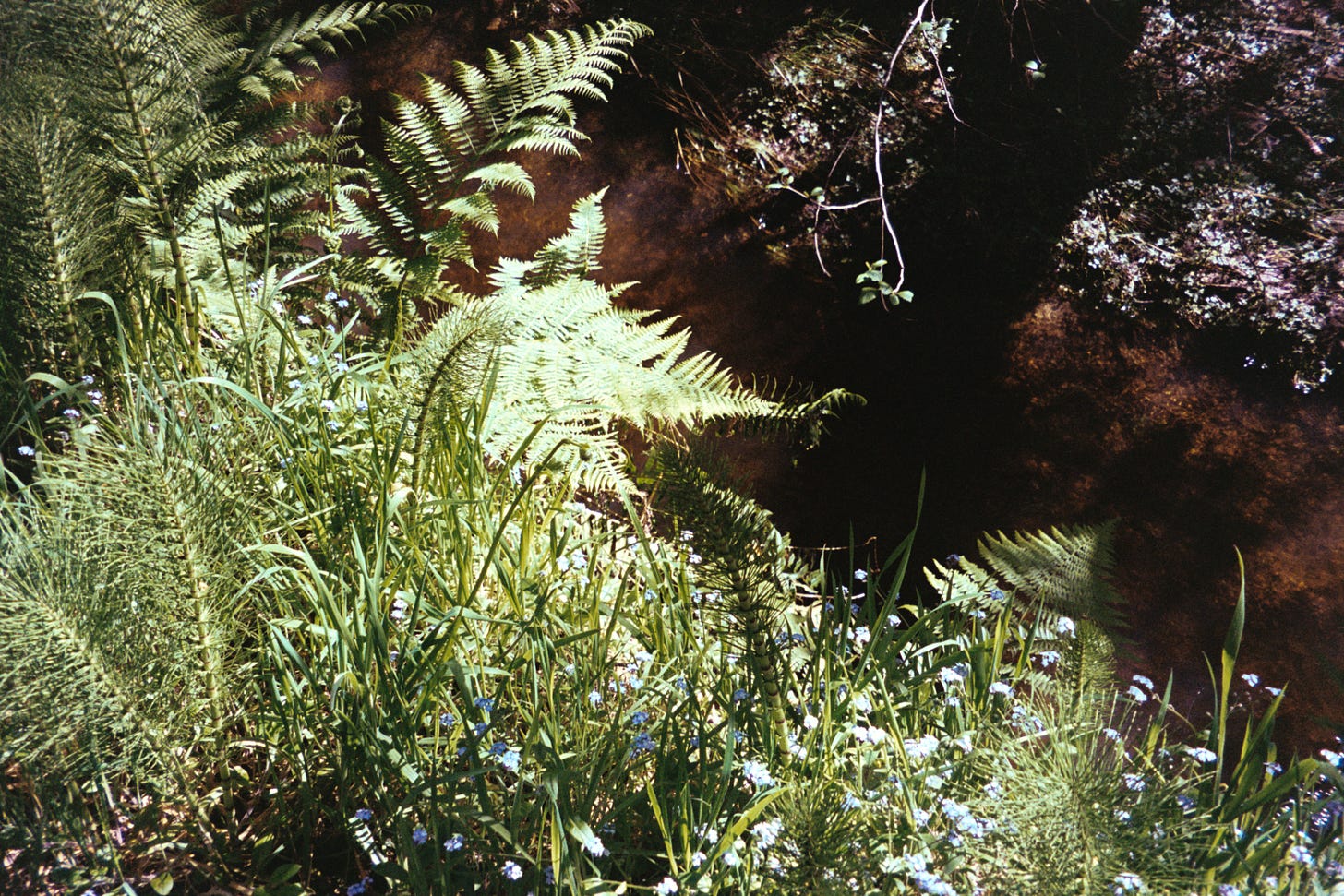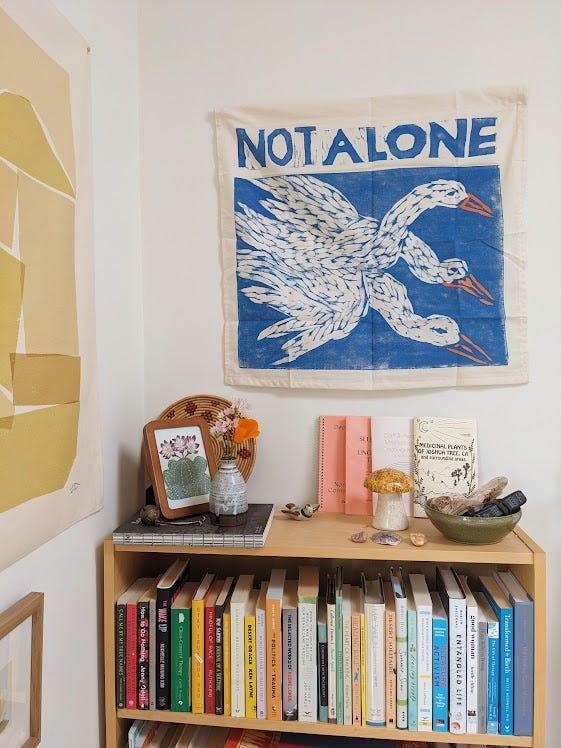Stay soft, I wrote
and four spiraling things
Human Stuff is a weekly-ish newsletter. Please feel free to share parts of this letter that connect with you, or send to someone you love. Thank you for reading, sharing, commenting, subscribing, for being here. It means something.
A song I’m loving:
1 — I was working on a project at a coffee shop earlier this week, sitting at a table next to two men in their 70’s. As I tend to do (I’m trying to not do this!), I eavesdropped on their conversation. They were meeting for the first time as part of a support group for older folks in the town where I live. They shared stories of growing up in Berkeley (“I used to call it Bizzerkeley!”), their longtime partnerships, their awe of the student protestors currently activating for a better world. One shared about his recent bout with depression and desire to form new friendships, how hard it was for him to socialize due to a lifetime of shyness. The other shared gratitude and warmth for his vulnerability. My eyes welled with tears multiple times listening to these two older men tenderly connecting with one another, trying to cultivate budding friendship and heartfelt conversation even in their later phases of life. I was awed.
I’ll be 37 on May 10th. So often, the narrator in my head insists I haven’t done enough yet, that the last few years haven’t included enough work or production, that the time to make new friends and projects has passed, that I’m behind. Some small yet mean part of me tells me the timeline I should be on is floating further and further away — that if something hasn’t happened yet, it won’t. It’s too late, that voice insists. And, listening to those two men putting themselves out there for new friendship in their 70’s, still seeing opportunity for true connection, I remembered Too Late doesn’t exist. Too Late is a construct, one I don’t need to buy into. Too Late reduces the power of possibility. Too Late is a lie, one meant to keep us from imagining new futures for ourselves and the world. Too Late doesn’t need to be a rule I constrict myself with. Too Late leaves so little room for what could be.
What would I do if I knew it wasn’t too late? What kind of courage could I muster if I knew more chances were ahead, even if they lead to failure? What would I pursue if I trusted there was so little time, yet somehow, also enough time? What would change if Too Late wasn’t a lens I moved from? I am lingering in these questions and noticing what they bring forth in and around me. Witnessing other people’s vulnerability always makes me feel more brave.
2 — Remind yourself it’s okay to be soft. Stay soft. I said this in my most recent therapy session and my therapist responded with, “can you write that down for yourself?” It’s in my notebook now. My heart has been thawing for the last six months while also dealing with an immense amount of both personal and collective grief. To open one’s heart in the midst of continued grief is to make oneself vulnerable to the elements of being alive: the harshness and the tremendous and everything in between.
It has long been a compulsion to keep my heart closed as a method of protection, especially when intense experiences or feelings arise. The walls were so comfortable to crouch behind. Yet I’m finding my heart asking me to keep softening, keep softening, keep softening. Soften into the grief. Soften into anger. Soften into betrayal. Soften into sorrow. Soften into ripening beauty. Soften into the unknown. And I’ve found that staying soft is giving me more access to feel my feelings without becoming them. The removed edge of protection lets care flow inward and outward more freely. This movement formed from softening is teaching me that soft is anything but flimsy or unsteady. It shapes us in ways hardness cannot. It helps us see clearly in ways rigidity won’t. Hurts are sharper with an open heart, but beauty is richer, too. Remind yourself it’s okay to stay soft. Stay soft.
3 — Yesterday, I shared with a dear friend an important project I’ve been working on for months. She’s the first person I let see it after sitting with it privately and quietly for hours upon hours, tinkering and rearranging and pouring into. It is so tender to share our hearts, our art, our work, our efforts with others, not knowing how they’ll respond. She texted me a few minutes after I shared and said, “holy shit, Lisa.” She later called me after looking it over fully and shared the most encouraging words, the most loving reflections. My heart softened more and it felt like one of the first times I was able to immediately absorb the gift of positive reflection, because it’s a project I, too, really believe in.
Wanting our work, our offerings, our selves to be liked and understood by all is such a gargantuan burden to carry. I’ve carried it for a long time. Being rejected, misunderstood, or disliked hurts, no matter how many books you’ve read on self-compassion. Yet there is something so rewarding about recognizing when you like something, when you understand something, when you believe in something. There is something magical about listening to what you know to be true, whether it’s about your work or your values or your beliefs or your preferences, and letting it be such — even if others don’t agree, but also when they do. Sometimes, getting encouragement can be a cherry on top and not the whole cake. Her reflections reminded me of how much I believe in what I’m working on, and that meant something in a different way than external validation has in the past. As it turns out, believing in ourselves makes letting in the true encouragement of others a little easier.
4 — Things that have made me feel less alone lately: The wave of students standing up for a better world. Heartfelt conversations with dearest friends. Moss on trees. Seaweed on rocks. My daughter’s eyes. My daughter’s sense of humor. Therapy sessions that reach beyond talking. Good books. Good walks. Encouragement. Tuning back into my own heart when others misunderstand where my heart is. Poetry. Small talk with people who work at the places I frequently go in town. Activism as an act of love. Logging off. Asking for help instead of holding alone what can be held by many. Having my honesty be truly heard and respected. The hollyhocks in the yard slowly blooming again. The first cornflower outside of my office. Strength training. Frequent thrift store visits. Playdates with friends and their kids. Kind emails from readers of this newsletter. Quietly working on projects that feel deeply heart-led. So much related to the heart. Images of spirals popping up everywhere. The ocean’s sounds. Imagining my 70-year-old self and what she’ll be doing with her energy. Imagining my seven-year-old self and offering her the nudges of love she needed. Rearranging things and thoughts. Letting myself dream up possibilities and trusting the risks of moving toward them without knowing where I will end up. The tenderness of trust.
5 — “Only parts suffer — not the whole.” Ken Wilbur says this in his book No Boundary, and it’s been circling in my heart so much lately. I spent the majority of my life zoomed in on the parts of me that suffer, on the pain, on the ache. Suffering was the lens I looked from. It’s easy to do this outwardly, as well… to only look at the hard parts of this world. They are often so glaring it can be difficult not to. Yet only parts suffer — not the whole. Suffering is not the entire picture, nor is it the whole experience. And when I zoom out of the parts of me, or the parts of the world, that are suffering, I am buoyed with the resource of goodness, of love, of awe, of laughter, of beauty, of connection, of momentum, of deep compassion, of art, of food, of life. The parts that aren’t suffering, that have never suffered, can become a resource to tend to the suffering from a place of real presence. The parts of me that have never experienced hurt can become a guide for the hurt I’m still moving through. The parts of the world that reflect love and connection can become nourishment for the parts that are sunken in the depths of pain.
What parts of me are suffering, and what kind of balm might those parts need?
What parts of me aren’t suffering, and what kind of balm might those parts offer?
These two questions have been swimming together, and the interwoven nature of them — the reminder that we can both give and receive, in so many ways— feels like a balm in itself. We each have parts of us that need something and parts of us that have something to offer; how relieving that this will forever be true.
Thank you, as always, for being here.
PS. I am writing this from bed (with the door closed) and just heard my daughter ask my husband, “Is mama almost done?” He responded, “I bet she’s almost done! She’s going to send out her newsletter to lots of people and it will make them feel so happy.” The sweetness of a tiny moment — keeping an eye out for them today.
△ This gorgeous piece from Chloe Cooper Jones, in NYT Magazine
△ On talking to chronically ill friends
△ Befriending our mortality, from the magnificent
△ adrienne maree brown offering deep, deep wisdom as always
△ This episode of the Belonging podcast was so great
△ When the earth started to sing
△ My new banner, reminding me when I forget:
With care,
Lisa








Such a beautiful piece... so timely... so right there... just loved your eavesdropping as I’m going to be 75 this year and always wondering if I’ll make new friends... I just loved this... made my day ❤️
Your husband was absolutely right - this newsletter brings me hope and happiness. Thank you for your beautiful words of wisdom and care. xx